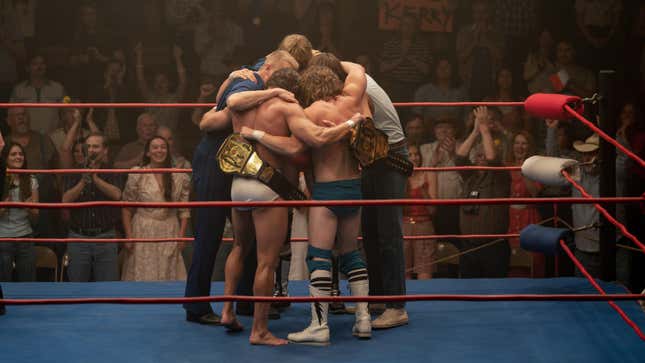
In pro wrestling, there are babyfaces (the good guys) and heels (the bad). The best matches tell the story of a babyface overcoming a dastardly heel’s dirty taunts and crooked tricks to win. The famed and supposedly cursed real-life Von Erich wrestling family of Texas was a brotherhood of babyfaces with a heel for a patriarch, and their tragic story is defined by adversity without comeback.
Sean Durkin’s beautifully performed but hurried biopic, The Iron Claw, squares up with the Von Erichs and their near-constant misfortunes. Even in the world of pre-determined fights, where premature death and life-altering injury go hand-in-hand with star-making championship runs, the Von Erichs are an extreme. Once a family of five brothers destined for greatness, all but one remains. In Durkin’s “Inspired by a True Story” telling, brothers Kevin (Zac Efron), Kerry (Jeremy Allen White), Dave (Harris Dickinson), and Mike (Stanley Simons) would always submit to their father, Fritz Von Erich (Holt McCallany), and his iron claw.
The film opens with Fritz as an uncontrollable Raging Bull grappler in the early ’60s. In tight close-up and stark black-and-white, McCallany inhabits the unflappable taskmaster, doing his best to sell the crowd on the ruthlessness he’d bring home with him. It was no gimmick. Fritz was a stern and unsympathetic father, placing an unsustainable amount of pressure on his boys and pitting them against each other in hopes of producing a world champion.
The Iron Claw centers on a decades-long feud between Fritz and Kevin Von Erich, the second oldest Von Erich after a brother who died in childhood. Fritz wanted a wrestling dynasty that could finally bring the Von Erichs national exposure, and he had a star in Kevin. He was the first to “pop” in Fritz’s World Class Championship Wrestling promotion but not the last. The family can’t even get through breakfast without Fritz asking his youngest when he’s going to start thinking about his future and join his brothers in the ring.
The best parts of The Iron Claw don’t come from tragedy or bouts with Fritz. It’s when the brothers are together, eating burgers and listening to Tom Petty, or locking arms with opponents in the film’s many thrilling brawls. Ditching the omniscient camera work of Fighting With My Family, Durkin’s lens stays within striking distance of the performers. For their part, Efron, Dickinson, and White show no signs of ring rust. Their movements are as fluid as the Von Erichs in Durkin’s recreation of wrestling’s first boom period. But the moments of calm are where Durkin finds his footing, dipping into rhythms that are slower and more lyrical, building on the shared pain and trauma of the family.
The chemistry between the brothers is palpable, creating emotional heft behind each victory and defeat. Efron is the main event as the eternally punished Kevin. An emotionally complicated and physically demanding performance—and to be clear, Efron looks yoked out of his mind—he’s captivating whether he’s drop-kicking The Fabulous Freebirds or eating ribs with his girlfriend (Lily James). He radiates love and anguish as he watches helplessly as one brother after another falls. Fritz uses the chinks in Kevin’s armor against him, attacking any and all perceived weaknesses. Spend too long on the mat recovering from a suplex? Well, Dave’s getting a title shot. He’s better on the mic anyway. The hits never stop coming.
Durkin’s gift is as a stylist, with his camera soaking in the grief-stricken atmosphere until it’s dripping with dread. As in his previous haunted family portraits, Martha Marcy May Marlene and The Nest, Durkin uses these toxic family relationships to poison the idyllic Texas landscapes, harnessing the characters’ repressed rage and grief and balancing the spectacle of wrestling with the tension of being a wrestler. The director’s recreations of WCCW promo videos hiss with noise and menace as if the next Harley Race or Ric Flair challenge is the beginning of the next tragedy. And, oftentimes, they are.
The opening act of The Iron Claw is genuinely absorbing, with Efron, Dickinson, McCallany, and Maura Tierney, who plays the Von Erich matriarch, Dottie, creating a believable family dynamic. It’s when tragedies begin to pile up that The Iron Claw stumbles into cliche. When Kevin’s Olympian brother Kerry enters the picture, the movie kicks into biopic mode, setting up and knocking down one tragedy after another, often telegraphing the subsequent death so loudly that it feels contrived. Within these stretches of training montages and drug-fueled phone calls, The Iron Claw moves too fast for its own good, and even at 128 minutes, there isn’t enough time to cover all Durkin wants. Another tragic Von Erich, Chris, who also killed himself, was excised entirely. The fake Von Erich, Lance (played by AEW champion Maxwell Jacob Friedman), is reduced to a passing shot in one of the movie’s several rise-and-fall montages.
The Von Erichs were a family of babyfaces, some of the best in wrestling history. They looked and acted the part, but outside the ring, wins were few and far between. Every wrestling match needs a Big Comeback, where the heel allows the face to win the day. The Iron Claw doesn’t even humor one. Hobbling towards its melancholy ending, The Iron Claw reflects its subjects: It looks like a champion but can’t catch a break.